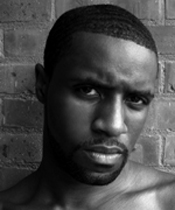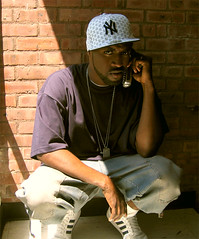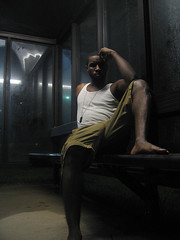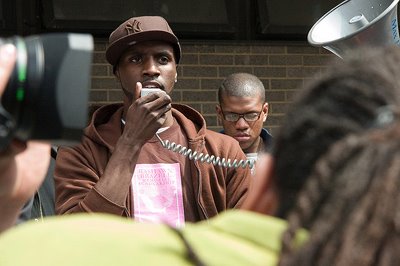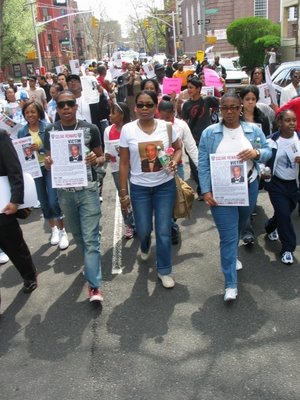Activism = Elitist?
In preparation for tomorrow's panel on the state of LGBT politics and activism, I was asked to think through a series of questions. I was so compelled, infuriated, perplexed, annoyed and tickled by the questions that I challenged myself to get my thoughts onto paper. I'll be sharing plenty of my responses with you here on this blog in the weeks to come, and I'd like to begin with the question that elicited the most lengthy and emotional response.
Is activism solely an elitist activity?
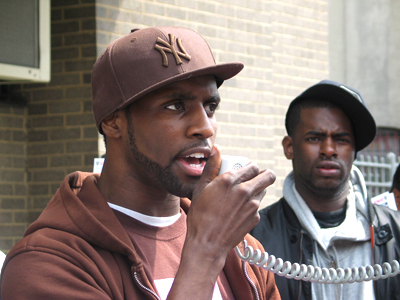
LarryLy addresses the crowd at the Rashawn Brazell Memorial March.
Photos by Andres Duque
Activism can often seem like an elitist enterprise, since we often use funding, corporate support and the audibility that they provide as the sole criteria by which determine the quality and impact of our work. Needless to say, this is a problematic practice, but not one essentially rooted in the enterprise of activism itself.
For me, the question of whether it is or is not fundamentally elitist lies in this question: How do we measure the success of activism? How do we quantify the impact of our work? More responsible conversations in our public forums or more government funding? (These two are not mutually exclusive, but they do represent two estranged value systems.)
 An example from my work: When the press was hungry for quotes about the horror of hate crimes, the RBMF instead offered a broader commentary about the value of black gay life in general. In our public statements and in the building of our organization, we refused to use the narrow vectors of crime and disease to define our lives and instead pushed a platform that identified and prioritized the root issues to which the mainstream media felt they had no responsibility: namely, the social penalties for standing at the intersection of marginal identities.
An example from my work: When the press was hungry for quotes about the horror of hate crimes, the RBMF instead offered a broader commentary about the value of black gay life in general. In our public statements and in the building of our organization, we refused to use the narrow vectors of crime and disease to define our lives and instead pushed a platform that identified and prioritized the root issues to which the mainstream media felt they had no responsibility: namely, the social penalties for standing at the intersection of marginal identities.Instead preoccupying ourselves with the race and sexuality of Rashawn’s killer (which will not be determined until the NYPD invest the same amount of resources in the investigation as they did with Nicole DuFresne and Emmet StGuillen), we consistently spoke about the role that Rashawn’s intersectional identity plays in the ongoing disparity in the coverage the cases receive and their attendant public outcry.
Why? Because the race, sexuality and even the motivation of the killer cease to be significant priorities when the police, the media and the public refuse to value the life of the victim.
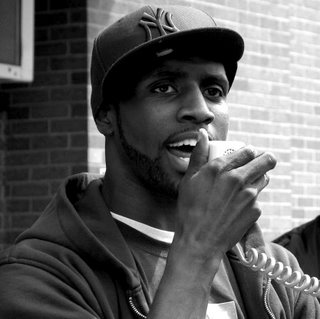 So, in what some might identify as a key moment in the history of black LGBT organizing in New York, we used our audibility strategically to create more and louder conversations about the value of our lives. I like to think that our work is playing a role in shifting the community further away from the pigeon hole of single-issue organizing and toward a more holistic platform that honors the complexity of our lived experience as an intersectional people. To me, this is an important development in the landscape of black LGBT organizing.
So, in what some might identify as a key moment in the history of black LGBT organizing in New York, we used our audibility strategically to create more and louder conversations about the value of our lives. I like to think that our work is playing a role in shifting the community further away from the pigeon hole of single-issue organizing and toward a more holistic platform that honors the complexity of our lived experience as an intersectional people. To me, this is an important development in the landscape of black LGBT organizing.However, the Memorial Fund boasts no corporate sponsors and no steady source of income, save our grassroots fundraisers. Whereas the RBMF staff has had to work doggedly for nearly a year just to touch the $5000 mark, Imette St. Guillen's folks were able to generate more than $250,000 in less than five months.
So, if one uses financial gain as the means to evaluate the efficiency of the RBMF, we may not appear to be as successful as our white, straight, upper and upper middle-class compatriots in the fight against violence. Indeed, this reality reeks of a synthesis of racism, classism and homophobia that adds insult to injury for a community morning the loss of a brother, son, lover and friend. And this is the reality that I’ve dealt with everyday since March 4, 2005, when I got news of Rashawn’s murder.
Luckily for us, however, we do not measure the fruits of our activism this way. We are encouraged by the fact that despite the death grip of the compounded injustices at play in the Brazell murder, we have managed to contribute to a significant change in the way we talk about our lives, our bodies, our sex and our deaths.
So, my answer is no. Activism is not an elitist enterprise. Not for those of us whose value system is rooted steadfast in the health and well-being of our communities. Not for those of us who commit ourselves to the unglamorous work that goes on in between and after the marches, the rallies and the vigils. Not for those of us who do not enjoy the audibility afforded to the white heterosexual upper class and the hundreds of thousands of sympathetic dollars that their identities have a knack for garnering. It's not an elitist enterprise for me.
